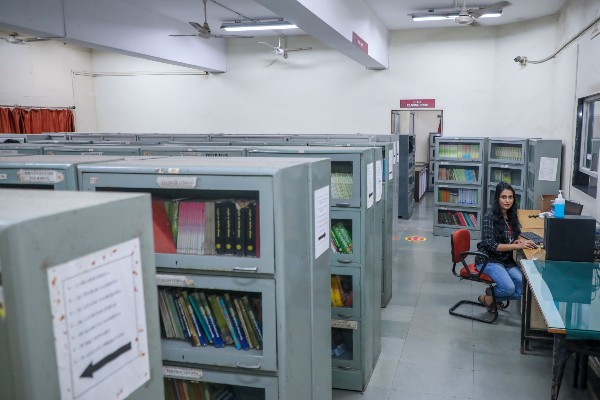Main Content
Library

Overview
A library is a treasure-house of knowledge. Libraries are an integral part of the education system and Education system remains incomplete without the library.
D.Y.P University School of Ayurveda has one of those libraries which is defined by its well-equipped collection of in numerous Books, National and International Journals. To enhance the Teaching learning process the library is accomplished with
special section of rare collection of books to foster quest in students. The library is housed in the second floor of our college building. It is designed to provide comfortable reading accommodation in abundant light, air and pleasant atmosphere with sitting capacity of 100 students, which includes reference / reading section, and circulation section.
Department of Ayurveda Library Committee Staff Members
| Sr. No. | Name | Position | Qualification | Contact | |
|---|---|---|---|---|---|
| 1 | Dr. Maheshkumar Harit | Ayurveda Chairman | M.D; Ph.D (Ayurved Samhita) | 9322217607 | maheshkumar.harit@dypatil.edu |
| 2 | Dr. Ashok Londhe | Ayurveda Co-Chairman | M.D (Ayurved Samhita Siddhant) | 9969190070 | ashok.londhe@dypatil.edu |
| 3 | Dr. Ritu Wadhwa | Ayurveda Member | M.D (Kayachikitsa) | 9969689240 | ritu.wadhwa@dypatil.edu |
| 4 | Dr. Kalpana Satpute | Ayurveda Member | M.D (Kayachikitsa) | 9890486825 | kalpana.satpute@dypatil.edu |
| 5 | Dr. Shruti Phatak | Ayurveda Member | M.D (Sharir Kriya) | 9821750582 | Shruti.phatak@dypatil.edu |
| 6 | Shubhangi Ahire | Ayurveda Librarian | MLISC (Library Science) | 8976689761 | dypcayurvedalibrary@gmail.com |
3. General Rules & Regulations of Library
01. Readers should observe strict silence inside the library.
02. Use of Mobile Phones is not permitted inside the library premises.
03. Users are not allowed to carry eatables/ drinks inside the library premises.
04. Library membership card is non-transferable.
05. Readers are not allowed to bring their personal books or any printed material (spiral/bound books/photocopied material) inside the library.
06. Personal belongings like bags (laptop, shoulder, sling), umbrellas etc. are not allowed in the library.
07. Marking, scratching, damaging, mutilating, stealing library materials or property will invite disciplinary action against the defaulters.
08. Readers should not talk or discuss as they may disturb other readers. Reading halls are meant for individual study and research only.
09. Users should not reset or keep their feet on tables, chairs, shelves, Etc.
10. The library shall not be responsible for any loss or damage of the personal belongings of the users.
11. Newspapers, magazines and journals must be read only in the library on specific tables and should not be taken to any other reading areas.
12. No library material can be taken out of the library without permission. Unauthorized removal of anything belonging to the library will
be treated as theft and dealt accordingly.
13. Anyone who violates the rules and regulations of the library would be liable to lose the privilege of library membership
and may be debarred from using the library facilities.
14. Issue of books in demand may not be renewed.
15. Users are advised not to issue Books to others on their names.
4. Acquisition Policy
A library acquisition policy is a formal statement that guides the library’s acquisition of materials to be added to
its collections. It has a number of elements each addressing a specific purpose.
1) It defines the scope of the libraries acquisition activity.
2) It lays the guidelines for acquiring materials for the collection of the library
3) The policies force the staff to think through library’s goals and commit themselves to these goals.
4) It helps the staff to identify the long-and-short-range needs of users and to establish priorities for allocating funds.
5. Overdue Charges
Library fines, also known as overdue fines, late fees, or overdue fees.
Students are given regular reminders and submissions are done within the given time frame of the book allotment hence no charges has been taken from students to till date.
